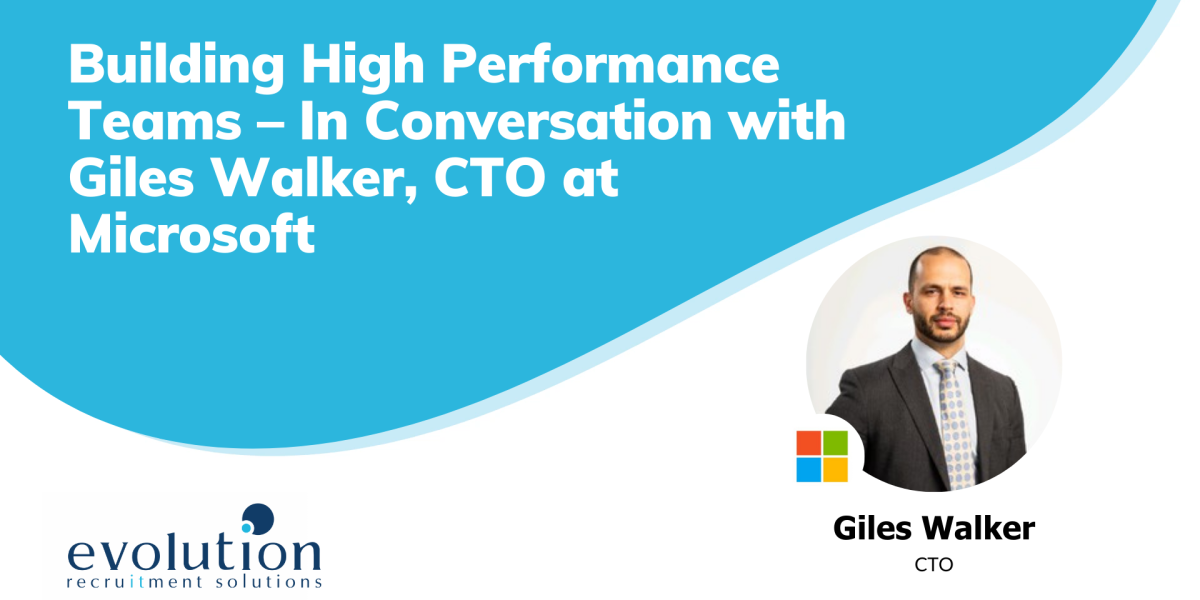
Giles Walker, Global CTO of Retail and Consumer Packaged Goods at Microsoft, began his tech career in data and AI. He grew up in the Middle East and visited Australia for a gap year – but ended up staying for fifteen years, working in tech, logistics and supply chain roles at John Deere and TasRail. Giles moved back to the UK four years ago, and started his current role at Microsoft in June 2021. As CTO, Giles supports Unilever on all of their digital strategies regarding Microsoft technology.
Anyone new to – or even experienced in – management will be keen to build a high performance team, in order to achieve the very best results. For Giles, the key to a high performance team isn’t one which is made up individually of the most talented people, but one in which people feel safe and trust each other.
“A high performance team to me is a team that actually knows how to work together. If you don’t know how to work together, you’re never going to be high performing.”
Creating an environment with this level of trust takes work, and it is something that Giles consistently embeds in his team. The most effective way of doing this is through leading by example; by asking what appear to be stupid questions and acknowledging mistakes or wrong directions. This builds the feeling within the team that making mistakes is acceptable, enabling creativity and comfort.
“Failing is just another way of learning. If you’re not failing, you’re not learning. If you always get it right, you’re completely wrong.”
This celebration of failure is integral to Giles’ leadership style. He recognises the importance of his team trying new things in order to reach a better outcome, and within that appreciates that each ‘failure’ shows the team what not to do next time – which is, in itself, a huge success.
Giles also ensures that everyone within his team feels confident speaking out, and works to proactively to uplift those who are not forthcoming with their ideas.
“If I notice that someone hasn’t spoken, I will call them out. If I ask ‘What are your thoughts?’ and they reply that they don’t have any, I’ll then pick something that I know they might have a thought on because it’s to encourage them to speak out. You have to start talking because it’s OK to talk in here. I’m encouraging it.”
Within most teams, improving productivity is an ongoing goal. For Giles, productivity comes from an environment where people feel safe and are given space to work on projects in a way that suits them. In a team where people are comfortable to try new things, they are more likely to come across efficient, inventive solutions.
“However you get there, it’s fine, as long as we achieve those goals. That’s how you get innovation, that’s how you get these changes in the ways we do things. It’s not by me telling you all the answers.”
Giles uses this formula when leading any team to get the best results. On one particular occasion, he was given leadership of a project which had been failing. Giles gave the team members a platform to air their grievances with how the team had previously been led, then asked them for their solutions to these issues – and encouraged them to enact these solutions. This gave them the freedom to work the way they wanted to, alongside a sense of ownership over the project.
“When I did that, it really helped them understand that actually they had a part to play in this. They’re not just following orders. They can actually influence it.”
Having positive relationships with team members is a vital part of a productive team, and this is something which has changed with the growth of hybrid and home working. With calls booked in advance and communication more regimented, the lack of ‘water-cooler’ conversations can mean an extended time between informal chats with certain people. Giles’ advice is to make specific time for these chats, giving people the opportunity to catch up and socialise regardless of where they are.
Giles finds the most enjoyable part of his role is seeing the difference that he makes. Within digital transformation, any project has a big impact – whether that be on efficiency, cost savings or customer experience – and being able to see this impact makes the career extremely rewarding.
For anyone who hopes to succeed in their career, having a supportive mentor (or mentors) is key. These don’t need to be formal mentors, but everyone will come across people throughout their careers who provide advice and inspiration. Giles’ advice is to make sure you listen to these people – even if what they are saying conflicts with your own thoughts.
“As I’ve gone through my career, different mentors have come and gone – all have played their parts. The most important thing is to always actually listen to the advice. If it’s a good mentor, they’ll tell you the advice that you need to hear, not what you want to hear.”